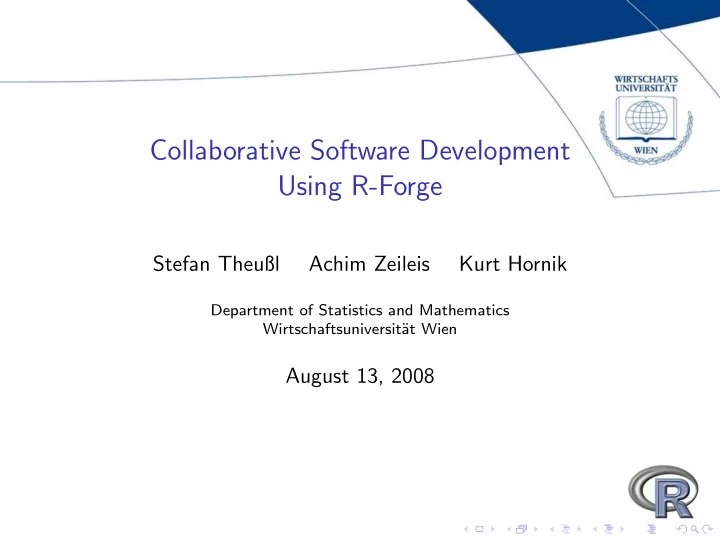

Collaborative Software Development Using R-Forge Stefan Theußl Achim Zeileis Kurt Hornik Department of Statistics and Mathematics Wirtschaftsuniversit¨ at Wien August 13, 2008
Why Open Source? ◮ Source code is by definition available to everyone ◮ Reuse of existing code ◮ Rapid creation of solutions within an open environment “Release early, release often” paradigm (Linus Torvalds) ◮ Peer review of open source software (OSS) A key to the success of open source projects is collaboration
Collaboration in the R Community ◮ For a decade, the R Development Core Team is using development tools like Subversion (SVN) for managing source code ◮ A central repository is hosted at ETH Z¨ urich for managing the development of the base R system ◮ Many package developeRs use similar infrastructure to manage their source code ◮ Around 46.8% of the 1500 packages available on CRAN are authored by more than two developeRs Number of authors per package in % 2 3 4 5 6 7 ≥ 8 23.9 11.6 6.3 2.4 1.3 0.4 0.8
Source Code Management Why do developeRs use source code management (SCM) tools? ◮ Efficient collaboration and sharing knowledge ◮ Easy communication through various channels ◮ Shared storage for source code ◮ Version control ◮ Larger software projects can be managed more efficiently ◮ UseRs may participate and give feedback
Introduction to R-Forge What is R-Forge? ◮ A central platform for the development of R packages, R related software and further projects ◮ R-Forge can be found at http://R-Forge.R-project.org ◮ R-Forge offers several tools to help package developeRs to collaborate Since starting the platform in early 2007 more and more interested useRs registered projects on R-Forge. Now after a year being in a development and testing stage nearly 200 projects and around 500 useRs are registered on R-Forge.
R-Forge is based on GForge What is GForge? Why is R-Forge based on GForge? ◮ GForge, a fork of the 2.61 SourceForge code, is an open-source project ( http://gforge.org ) ◮ GForge employs a php-postgresql framework to offer various tools for collaboration and source code management ◮ One of the most important reasons using GForge: It allows for the development and usage of plugins
Core Features of R-Forge ◮ Source code management with SVN ◮ A CRAN-style repository for hosting development releases of R packages ◮ Daily built packages are available for Linux, Mac OSX and Windows ◮ Packages can be downloaded from the website and/or installed in R via install.packages("foo", repos = "http://R-Forge.R-project.org")
Additional Features of R-Forge ◮ Mailing lists ◮ Discussion forums ◮ News announcements to be posted on homepage ◮ Project websites ( http://foo.R-Forge.R-project.org ) ◮ Project categorization ◮ Full repository backups ◮ And many more
Figure: Homepage of R-Forge
Projects ◮ Everything on R-Forge is organized in so-called projects ◮ Every Project has an SVN repository containing two pre-defined directories ◮ pkg . . . contains one or more R packages ◮ www . . . optionally contains a Project specific website ◮ Each member of a project is assigned a role (e.g., “Administrator” or “Developer”) with certain rights like write access to the repository, releasing packages to CRAN, . . .
Figure: Project Summary Page
Release and Quality Management ◮ Early versions of software projects are typically prototypes and therefore are not completely bug free ◮ Therefore, R-Forge offers a quality management system similar to that of CRAN ◮ In the spirit of OSS—“given enough eyeballs, all bugs are shallow” (Eric S. Raymond)—R-Forge additionally provides a bug tracking system for peer code review ◮ Eventually, packages passing R CMD check on R-Forge can be directly released to CRAN
Figure: R Packages Tab
Outlook and Future Work ◮ Introducing a file similar to DESCRIPTION for controlling the behaviour of the build/check process, etc. ◮ CRAN-style check summaries ◮ Automated check result delivery to mailing lists ◮ Task management, shared TODO lists ◮ Project wikis ◮ Sustainable improvement of the R-Forge manual
Outlook and Future Work Other features demanded by useRs: ◮ Inclusion of BioConductor and Omegahat repositories in build/check process ◮ Controlling of build/check process (e.g., via options passed to R CMD check , . . . ) ◮ Altering changelog messages in SVN repository ◮ Project renaming Open bugs: ◮ Tcl/Tk is not (yet) supported on our Mac ◮ Build/check process stability and performance
Contact ◮ Regarding R-Forge email: R-Forge@R-project.org Support tracker: https://R-Forge.R-project.org/tracker/?group_id=34 ◮ For everything else please contact me directly Stefan Theußl Department of Statistics and Mathematics Wirtschaftsuniversit¨ at Wien Augasse 2–6, A-1090 Wien Austria email: Stefan.Theussl@wu-wien.ac.at URL: http://statmath.wu-wien.ac.at/~theussl
Recommend
More recommend